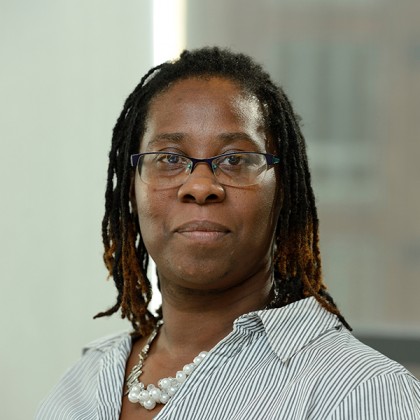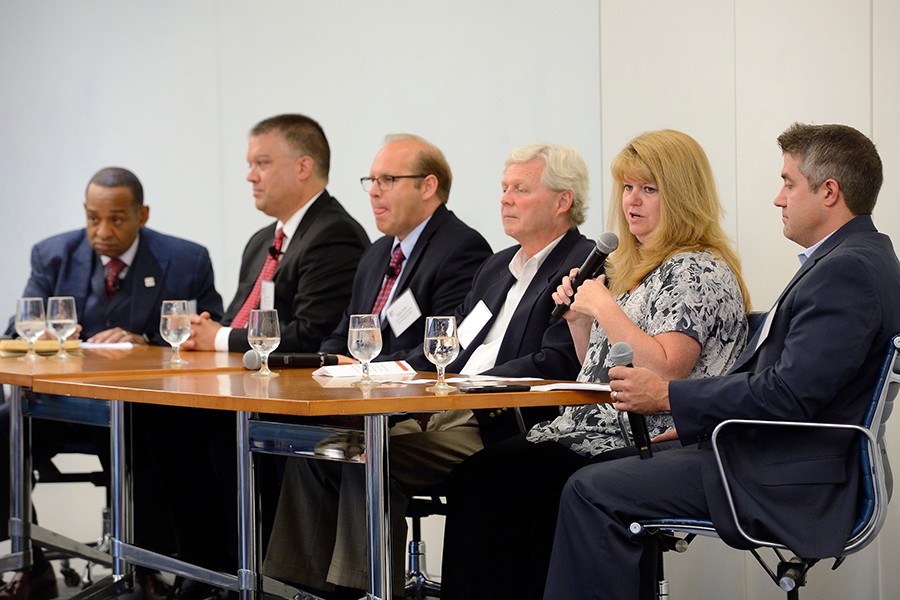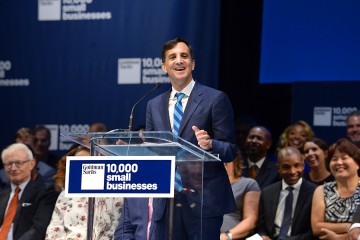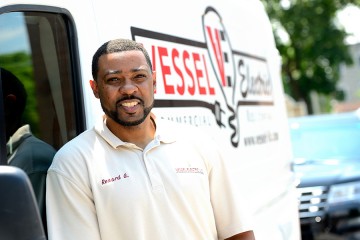For small business owners in Baltimore, it can be daunting to try to establish relationships with big names like Legg Mason, Whiting-Turner, Under Armour, BGE, and Johns Hopkins.
So the city's largest institutions are working together to demystify the process for smaller firms with events like the "Doing Business with Big Business" symposium held on Sept. 28.
The symposium was hosted by the BLocal Procurement Subcommittee, part of BLocal, an initiative spearheaded by Hopkins and 24 partner organizations to increase economic opportunities in Baltimore. BLocal was inspired by HopkinsLocal, Johns Hopkins' $69 million pledge to build, hire, and buy locally and to support Baltimore companies owned by women and minorities.
About 60 Baltimore City small business owners, including several women and minorities, gathered at Legg Mason for a panel discussion and Q&A with six procurement officers who shared what they look for when selecting suppliers and offered insights into supply chain logistics within their companies.
Also see
The takeaway? Whether they have large teams or small groups fielding inquiries from potential suppliers, BLocal partners are eager to increase their connections with qualified vendors in the city. The panelists shared helpful websites, phone numbers, and email addresses—both general contacts for their teams as well as their own direct lines—and encouraged thoughtful persistence.
"My advice is to be consistent," says Matt Blaney, Legg Mason's vice president and senior manager for procurement, who oversees a team of three people working on the company's supplier diversity program. "Show off that you are from Baltimore—that is very important to us. Show me your expertise, tell me who you have worked with, tell me what you've done. If I see those 410 and 443 numbers, I'm happy to pick up and talk to you. We're not some massive group where you're going to get lost in the shuffle."
At decentralized institutions like Johns Hopkins, both the health system and the university are working to make their purchasing systems easier to navigate for smaller companies while also making it easier for Hopkins employees to choose local vendors.
"On the university side, we have a Yelp-like supplier guide, where people provide comments internally to recommend local businesses," says Brian Smith, the university's chief procurement officer. "People can search by the type of business they need, whether it's minority-owned, and they can see a star rating and who rated it, so they can call that person to see what they thought of the business. We want to be there to be a champion for you to match demand and find opportunity."

Image caption: Tanika Burroughs dreams of opening a hospital-based salon to make patients and their caregivers look and feel their best
Image credit: Will Kirk / Johns Hopkins University
For the small business owners and entrepreneurs in attendance, the symposium provided a chance to network while gaining valuable information about how to connect with the bigger business community in Baltimore.
One of the entrepreneurs at the symposium was hair stylist Tanika Burroughs, who would like to bring her cosmetology skills to Johns Hopkins Hospital to help cancer patients dealing with hair loss. She named her company X-HALE Beauty, and her vision is to create tailor-made wigs and hair weaves, with an emphasis on pediatric patients so they feel like kids again, she says.
Burroughs also has caregivers in mind: "For doctors and nurses who are on call all the time, and for patients' family members who are in the hospital a lot, it would be great to run a salon inside the hospital for them. I want to make people feel good about themselves, whether they are patients or caregivers, so they can take a break without going anywhere."
Burroughs' out-of-the-box thinking is encouraged by the panelists. When moderator Robert Wallace, president and CEO of Bithgroup Technologies, asked each to give one word to describe his or her best suppliers and vendors, they replied with characteristics like innovative, creative, and entrepreneurial, and described the best relationships as partnerships with integrity.
For their part, the panelists said they are working harder than ever to court local suppliers and contractors. At Johns Hopkins Health System, Chief Procurement Officer Jeffrey Martin says his team is making a more concerted effort to communicate its needs to the Baltimore business community. Within the next month, the health system will post to its procurement website 124 initiatives for the coming year that ideally will be sourced by local vendors and suppliers.
"Have we set targets as a part of BLocal? Yes," Martin says. "I'm a big believer in beginning a deal with a specific goal in mind. It shouldn't be happenstance where we end up."
Posted in University News, Community
Tagged community, hopkinslocal, blocal










